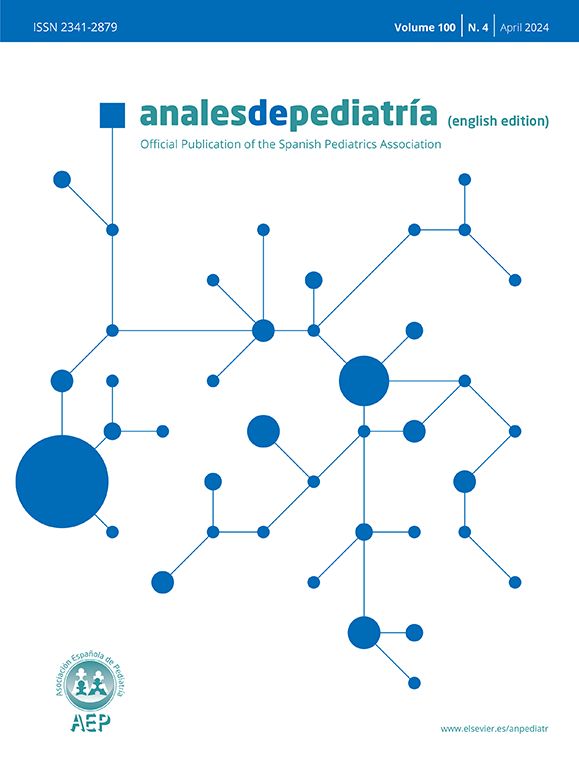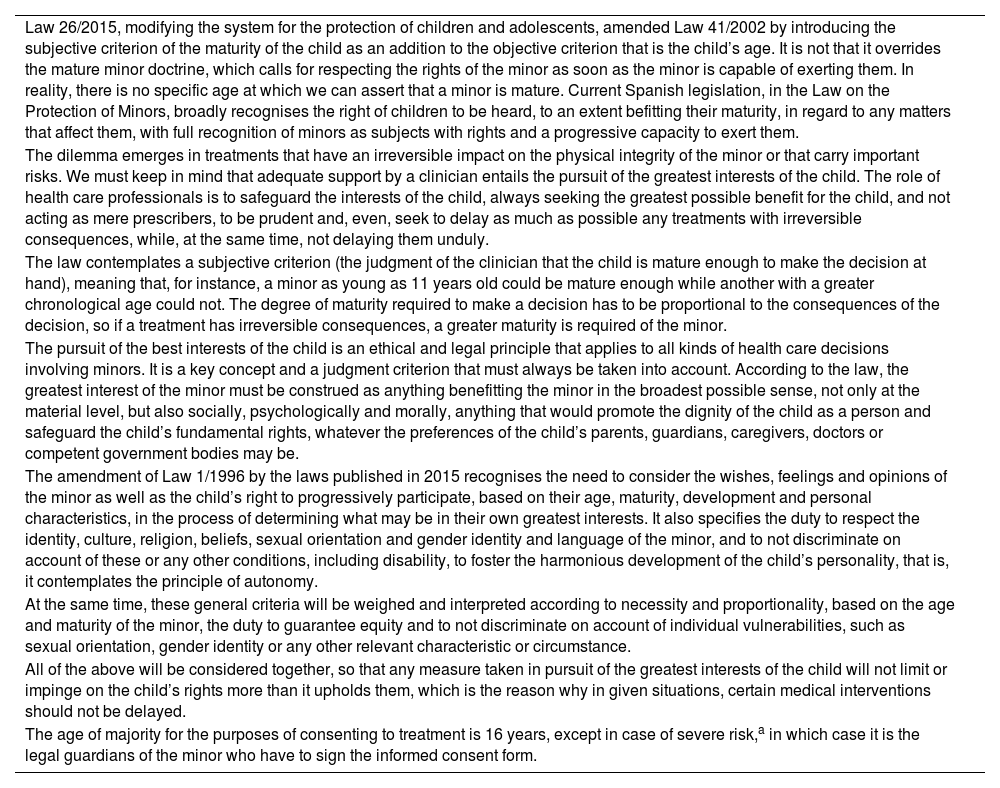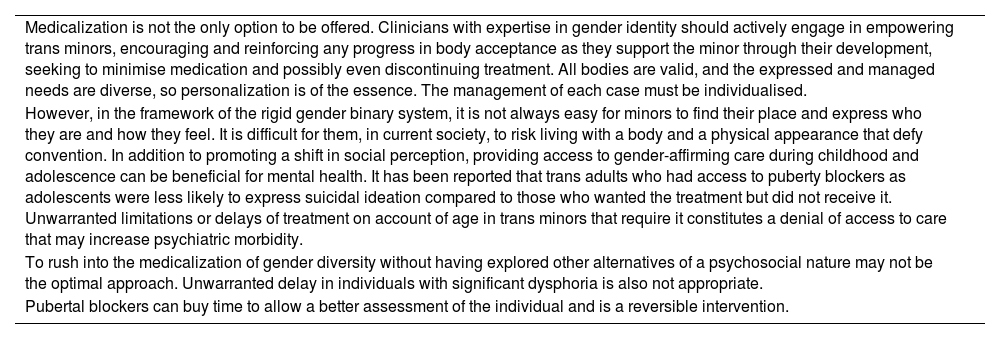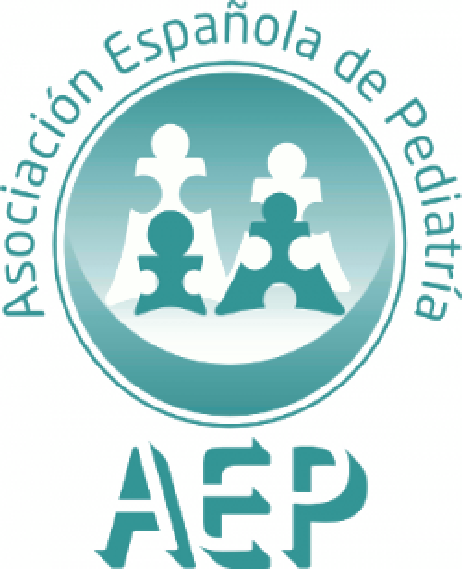We have carefully read with interest the reflections of Martínez de la Ossa Sáenz-López and Trujillo-Caballero in regard to our new publication, “Clinical practice guidelines for transsexual, transgender and gender diverse minors”,1 and found them very interesting. The submission guidelines placed constraints on its length, so some of the points in the article were not sufficiently elaborated. We are aware of the challenge of finding the right balance in pursuit of the best interests of the child. We know that supporting gender nonconforming minors is complex, and denying them care can be as harmful as the rash and indiscriminate medication of individuals with gender incongruence. The clinical and ethical/legal aspects must be addressed prudently (Table 1).2
Ethical and legal aspects regarding decision-making in the management of trans minors.
| Law 26/2015, modifying the system for the protection of children and adolescents, amended Law 41/2002 by introducing the subjective criterion of the maturity of the child as an addition to the objective criterion that is the child’s age. It is not that it overrides the mature minor doctrine, which calls for respecting the rights of the minor as soon as the minor is capable of exerting them. In reality, there is no specific age at which we can assert that a minor is mature. Current Spanish legislation, in the Law on the Protection of Minors, broadly recognises the right of children to be heard, to an extent befitting their maturity, in regard to any matters that affect them, with full recognition of minors as subjects with rights and a progressive capacity to exert them. |
| The dilemma emerges in treatments that have an irreversible impact on the physical integrity of the minor or that carry important risks. We must keep in mind that adequate support by a clinician entails the pursuit of the greatest interests of the child. The role of health care professionals is to safeguard the interests of the child, always seeking the greatest possible benefit for the child, and not acting as mere prescribers, to be prudent and, even, seek to delay as much as possible any treatments with irreversible consequences, while, at the same time, not delaying them unduly. |
| The law contemplates a subjective criterion (the judgment of the clinician that the child is mature enough to make the decision at hand), meaning that, for instance, a minor as young as 11 years old could be mature enough while another with a greater chronological age could not. The degree of maturity required to make a decision has to be proportional to the consequences of the decision, so if a treatment has irreversible consequences, a greater maturity is required of the minor. |
| The pursuit of the best interests of the child is an ethical and legal principle that applies to all kinds of health care decisions involving minors. It is a key concept and a judgment criterion that must always be taken into account. According to the law, the greatest interest of the minor must be construed as anything benefitting the minor in the broadest possible sense, not only at the material level, but also socially, psychologically and morally, anything that would promote the dignity of the child as a person and safeguard the child’s fundamental rights, whatever the preferences of the child’s parents, guardians, caregivers, doctors or competent government bodies may be. |
| The amendment of Law 1/1996 by the laws published in 2015 recognises the need to consider the wishes, feelings and opinions of the minor as well as the child’s right to progressively participate, based on their age, maturity, development and personal characteristics, in the process of determining what may be in their own greatest interests. It also specifies the duty to respect the identity, culture, religion, beliefs, sexual orientation and gender identity and language of the minor, and to not discriminate on account of these or any other conditions, including disability, to foster the harmonious development of the child’s personality, that is, it contemplates the principle of autonomy. |
| At the same time, these general criteria will be weighed and interpreted according to necessity and proportionality, based on the age and maturity of the minor, the duty to guarantee equity and to not discriminate on account of individual vulnerabilities, such as sexual orientation, gender identity or any other relevant characteristic or circumstance. |
| All of the above will be considered together, so that any measure taken in pursuit of the greatest interests of the child will not limit or impinge on the child’s rights more than it upholds them, which is the reason why in given situations, certain medical interventions should not be delayed. |
| The age of majority for the purposes of consenting to treatment is 16 years, except in case of severe risk,a in which case it is the legal guardians of the minor who have to sign the informed consent form. |
We must not forget that gender-affirming care prevents severe mental illness or even suicide3 and that detransition after social transitioning continues to be infrequent based on recent data published by the Trans Youth Project.4 The unjustified limitation or delay of care for trans youth that clearly need it on account of age could increase the incidence or severity of psychiatric disorders.
We understand that medicalization is but one of the available resources, and not the only one. Although some trans individuals require medication, there is a growing number that do not. In the past years, there has been a decrease in the demand for feminizing surgery. This phenomenon is due to improving trends in body positivity, self-esteem and social skills (Table 2).
Summary of considerations in the management of trans minors.
| Medicalization is not the only option to be offered. Clinicians with expertise in gender identity should actively engage in empowering trans minors, encouraging and reinforcing any progress in body acceptance as they support the minor through their development, seeking to minimise medication and possibly even discontinuing treatment. All bodies are valid, and the expressed and managed needs are diverse, so personalization is of the essence. The management of each case must be individualised. |
| However, in the framework of the rigid gender binary system, it is not always easy for minors to find their place and express who they are and how they feel. It is difficult for them, in current society, to risk living with a body and a physical appearance that defy convention. In addition to promoting a shift in social perception, providing access to gender-affirming care during childhood and adolescence can be beneficial for mental health. It has been reported that trans adults who had access to puberty blockers as adolescents were less likely to express suicidal ideation compared to those who wanted the treatment but did not receive it. Unwarranted limitations or delays of treatment on account of age in trans minors that require it constitutes a denial of access to care that may increase psychiatric morbidity. |
| To rush into the medicalization of gender diversity without having explored other alternatives of a psychosocial nature may not be the optimal approach. Unwarranted delay in individuals with significant dysphoria is also not appropriate. |
| Pubertal blockers can buy time to allow a better assessment of the individual and is a reversible intervention. |
Puberty blockers prevent the development of unwanted and potentially permanent secondary sexual characteristics and is a reversible intervention. It is rarely prescribed before age 12 years and should never be given to prepubertal children. It also need not be followed by subsequent gender-affirming treatment, as seems to be implied by the reflection of the authors. It is an option that buys valuable time to empower the child and work on other alternatives, although this approach may not fit all children, and allows the child to be more involved in decision-making. In any case, we do not support its indiscriminate use in minors expressing gender incongruence, but we would not deny puberty blockers to those who need it, prescribing them only if the minor expresses distress and has been adequately informed.
As regards the Divisional Court judgment of December 2020 in the case of Bell vs Tavistock that the authors refer to in their letter, it was revoked on September 17, 2021 by the Court of Appeal of England and Wales.5 The new judgment ruled that it was on the clinicians rather than the court to decide on competence, recognising the importance of a correct informed consent process for the treatment of trans minors.
We must not forget that each case is unique and must be carefully evaluated in pursuit of the greatest interests of the child. We think that updated clinical guidelines can be a great help, but it is our responsibility as providers to know in whom, how and when to apply them with caution, quality and empathy, facing the intrinsic uncertainty and complexity with a multidisciplinary approach and working in care teams composed of professionals with expertise in gender identity.







